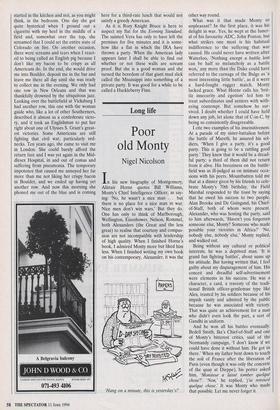Long life
Poor old Monty
Nigel Nicolson
In his new biography of Montgomery, Alistair Horne quotes Bill Williams, Monty's Chief Intelligence Officer, as say-
ing: 'No, he wasn't a nice man but there is no place for a nice man in war. Nice men don't win wars.' But they do. One has only to think of Marlborough, Wellington, Eisenhower, Nelson, Rommel, both Alexanders (the Great and the less great) to realise that courtesy and compas- sion are not incompatible with leadership of high quality. When I finished Home's book, I admired Monty more but liked him less. When I finished writing my own book on his contemporary, Alexander, it was the `Hang on a minute, this is yesterday's!' other way round.
What was it that made Monty so unpleasant? In the first place, it was his delight in war. Yes, he wept at the funer- al of his favourite ADC, John Poston, but what strikes one most is his habitual indifference to the suffering that war caused. He could never have written after Waterloo, 'Nothing except a battle lost can be half so melancholy as a battle won,' any more than the Duke could have referred to the carnage of the Bulge as 'a most interesting little battle', as if it were a hard-fought rugger match. Monty lacked grace. What Home calls his 'brit- tle insecurity and egotism' led him to treat subordinates and seniors with with- ering contempt. But somehow he sur- vived. I doubt whether I could have held down any job, let alone that of C-in-C, by being so consistently disagreeable.
I cite two examples of his insensitiveness. At a parade of my sister-battalion before the battle of Mareth, he assured his sol- diers, 'When I give a party, it's a good party. This is going to be a rattling good party.' They knew that it would be a dread- ful party; a third of them did not return from it alive. His breeziness on the battle- field was as ill-judged as on intimate occa- sions with his peers. Mountbatten told me that at a dinner given by his friends to cele- brate Monty's 70th birthday, the Field Marshal responded to the toast by saying that he owed his success to two people, Alan Brooke and De Guingand, his Chief- of-Staff, both of whom were present. Alexander, who was hosting the party, said to him afterwards, 'Haven't you forgotten someone else, Monty? Someone who made possible your victories in Africa?"No, nobody else, nobody else,' Monty replied, and walked out.
Being without any cultural or political interests, he was a deprived man. 'It is grand fun fighting battles', about sums up his attitude. But having written that, I feel guilty about my disparagement of him. His conceit and dreadful self-advertisement were elements in his success. He was a character, a card, a travesty of the tradi- tional British officer-gentleman type like Alex, trusted by his soldiers because of his impish vanity and admired by the public because he was associated with victory. That was quite an achievement for a man who didn't even look the part, a sort of Gandhi in uniform.
And he won all his battles eventually. Bedell Smith, Ike's Chief-of-Staff and one of Monty's bitterest critics, said of the Normandy campaign, 'I don't know if we could have done it without him. He got us there.' When my father bent down to touch the soil of France after the liberation of Paris (even though it was only the concrete of the quay at Dieppe), his porter asked him, 'Monsieur a laisse tomber quelque chose?'. Won,' he replied, Tai retrouve quelque chose.' It was Monty who made that possible. Let me never forget it.


































































 Previous page
Previous page